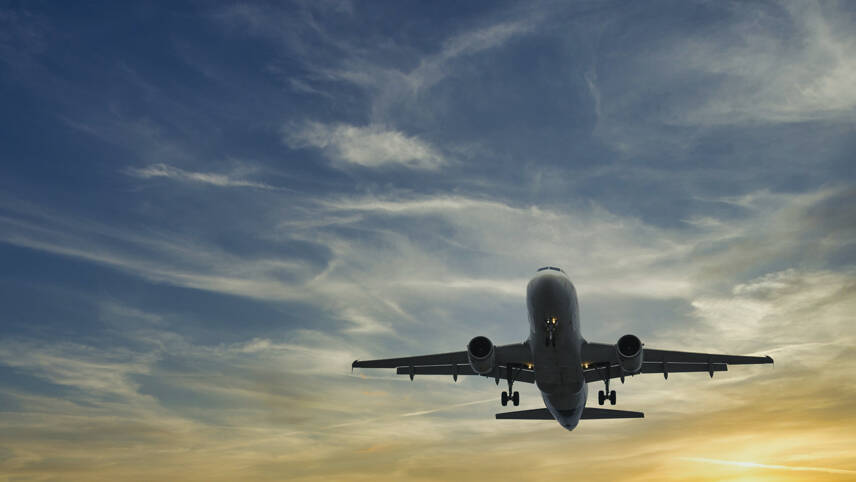Register for free and continue reading
Join our growing army of changemakers and get unlimited access to our premium content

Called Avelia, the scheme is offering around one million gallons of SAF in the first instance, which its co-founders claim makes it the largest of its kind to date. This amount of fuel could cover 15,000 individual business traveller flights from London to New York, the co-founders state.
There are many business flight schemes through which customers can either offset the emissions related to their tickets or purchase SAF, but this is believed to be the first of its scale to utilise blockchain.
Business customers will be able to book flights using the American Express Global Business Travel (Amex GBT) platform and request verification that SAF, equivalent to that which would have been used if their flights had directly been powered with the maximum blend of 50%, has been produced and supplied. Verification will be provided in the form of blockchain-generated tokens, which have a tamper-proof audit trail.
Shell will produce the SAF while Accenture is contributing its IT services and partnering with the Energy Web Foundation to use its existing blockchain platform, powered by Microsoft’s Azure.
Shell currently manufactures SAF using agricultural wastes in Rotterdam, and at a separate facility fed by agricultural wastes and virgin plant feedstocks in Singapore. It is aiming to produce at least two million tonnes of SAFs annually from 2025 and to continue expanding production through to the 2030s, eyeing new production and blending facility locations in markets including the UK to meet these aims.
Shell claims that its SAF can reduce lifecycle emissions by up to 80% when compared with traditional jet fuel, if it is used neat. Current international regulations limit the maximum proportion of SAF in blends to 50%, however. Barriers to using neat SAF include the need for the development of suitable engines and the need to scale up SAF production while avoiding unintended negative consequences, such as poor land-use practices for feedstock crops. SAF currently costs between two and eight times as much as conventional jet fuel, depending on national markets and feedstocks, as it is yet to benefit from the same ‘economies of scale’ benefits as kerosene.
“SAF is a key enabler of decarbonisation in the aviation industry, and it is available today- however, it is currently scarce and costs more than conventional jet fuel,” said Shell Aviation’s president Jan Toschka. “Avelia will help trigger demand for SAF at scale, providing confidence to suppliers like us to further increase investment in production, and in turn helping to lower the price point for these fuels.”
Shell, Accenture, and Amex GBT will notably use the Avelia platform for all of their own business flights.
SAF – the state of play
SAF has proven to be a popular approach to decarbonisation for the aviation industry, which is responsible for 3% of annual global emissions and which – pandemic aside – had been growing rapidly in terms of passenger numbers and emissions for a decade.
It is doubtless so popular because using blends of 50% is a ‘drop-in’ solution, requiring no changes to aircraft – as would be necessary for electrification or the use of hydrogen. The UK’s industry body for sustainability in aviation is planning to prioritise SAF use, efficiencies and offsetting to reach net-zero, and this approach has influenced national policymaking on the issue.
This approach is against the recommendation of the UK’s Climate Change Committee (CCC). The CCC’s most optimistic forecast for the use of SAF in the UK’s aviation industry is for it to cover 7% of fuel supply in 2030. With this in mind, and with electric and hydrogen technologies for large planes still years from maturity, the CCC has recommended that the Government caps airport expansion and limits the growth in passenger numbers. The Conservative Party has, to date, been staunchly against this approach – as have most large businesses in the sector.
Instead, the Government is planning to deliver a rapid scaling of SAF production. Ministers have asked the industry to collaborate to bring at least three commercial SAF production plants online in the UK by 2025. The Government has partnered with LanzaTech, Velocys and Philipps 66 to help deliver this ambition, through its Jet Zero Council.
To ensure adequate demand for these SAFs, the Government is mulling a SAF mandate. Its proposals involve requirements for jet fuel producers to ensure that at least 10% of their production annually is SAF by 2030, rising to 75% by 2050. The EU is considering a similar mandate.


There’s no such thing as “sustainable aviation fuel” – the atmosphere doesn’t care what carbon we burn. Stop lying.